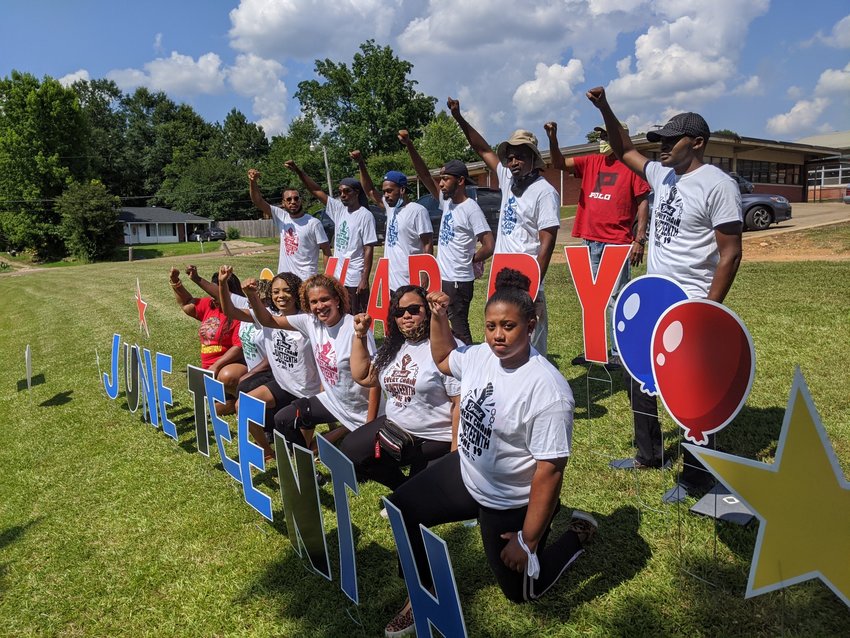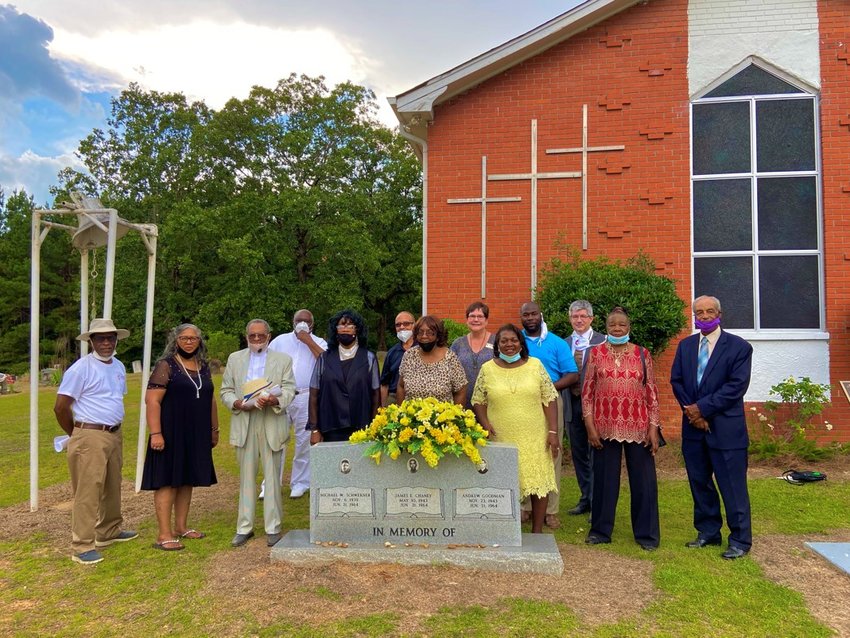Bishop: Racism is not dead, must be fought
Recognizing the struggle with racism is not dead and must be continually fought, United Methodist Bishop James E. Swanson, Sr., told those gathered to memorialize three young men who were murdered here 56 years ago this past Sunday registering blacks vote that “the upheaval we are experiencing today is telling us something.”
The crowd gathered outside the Mt. Zion United Methodist Church in the Longdale community. was much smaller than the gatherings of previous years because of the coronavirus pandemic. About 50 people attended in person and the service was livestreamed on Facebook.
Rather than being packed inside the small sanctuary with standing-room-only and overflow in the family life center like years of old, Sunday’s remembrance was a more reserved affair, and the audience sought shade under a small oak tree under the unrelenting Mississippi sun. The tree is one of three oaks that were planted around 1989 in memory of the young men.
The church provided water and hand sanitizer and most wore facemasks because of the pandemic.
Swanson was unable to be physically present because of coronavirus concerns, and originally, the plan was to bring Swanson and some of his children to celebrate Father’s Day. Instead, Swanson recorded a message shown at the ceremony.
Reclaiming, restoring, and renewing was this year’s theme.
On June 21, 1964, the three young men, James Chaney, 21, Andrew Goodman, 20, and Michael Schwerner, 24, were ambushed while in town investigating the burning of Mt. Zion on June 16.
In 1967, seven men were convicted of conspiring to violate the civil rights of the three murder victims, and in 2005, Edgar Ray Killen was convicted on three counts of manslaughter for orchestrating the murders and was ordered to serve three consecutive 20-year sentences. Killen died in prison in 2016 at age 92.
The theme of this year’s event, “Reclaiming, Restoring, and Renewing,” was baked into the program itself with a quartet from Philadelphia’s First United Methodist Church singing the spiritual “I’ll Fly Away.”
An award was presented to Keith D. Parker for his contributions to Mt. Zion and assistance for the memorial service and to Evelyn Calloway for her valuable contributions to the planning of Mt. Zion’s annual memorials along with Jewel McDonald
Swanson’s message focused heavily on the idea of recognizing the continuity of struggle with the three men murdered in 1964, that racism is not dead and must be continually fought against. Playing off the theme of the day, Swanson pushed the audience to reclaim their passionate desire for equality, restore their sense of defeating racism as the end goal, and renew their commitment to never give up the fight.
“In the midst of celebrating and commemorating the sacrifices of James Chaney, Michael Schwerner and Andrew Goodman, and the burning of historic black churches, and the lynchings and other acts of violence that happened during the Freedom Summer of 1964, and I even believe the upheaval we are experiencing today is telling us something here,” Swanson said. “And that the struggle is not over.”
Swanson used the analogy of Jason Voorhees from the famous 1980s horror movie franchise to describe the feeling of unending struggle with racism and oppression. Just as Jason was vanquished in the first movie, Swanson rejoiced at the seeming end of racism in America following the achievement of legislative action in the Civil Rights Era of the 1960s.
However, just as Jason in every one of his subsequent appearances, Swanson realized racism would continue to show itself, again and again. On the verge of tears, Swanson confided he had just recently made the realization he might not see the end of racism in his lifetime.
“There are some enemies that you fight, and you defeat them immediately,” Swanson said. “And you never see them again. Some you fight, and you win over a series of battles. Some enemies you fight, and that battle goes on for a lifetime. There are some enemies that we fight, and you never see them defeated in your whole life. The best thing we can do is equip those who follow you to be able to carry on the battle and to wrestle a better wrestling match than you last saw it.”
Rev. Lydia Dailey, the current pastor of Mt. Zion, pointed to current events to show the battle is not won, and that the day’s ceremony is a testament to those who have fought and those currently fighting, until the need for fighting is no longer there.
“We hope that this little moment of worship serves as a reminder to each of us that what happened 56 years ago is still happening now, and that’s partially why we’re still celebrating,” Dailey said. “We haven’t gotten through police brutality, the brutal slaying of our African American men and women. We’re still struggling to be the people who God has created us to be.”
Rev. Dayna Goff, the district superintendent of the Meridian District of the United Methodist Church, was present for her third year at the ceremony, and she spoke of why she feels the commemoration is impactful to her.
“It has opened my eyes so much to the ongoing struggle for civil rights, not just the events of these last few weeks, but over the years, you know, how far Mississippi has come but how far we still have to go, and we always have to be diligent in continuing the course and treating one another as equals,” Goff said. “We are; we are all created in God’s image.”
Rev. Lindsey Kidd, the pastor of New Bethlehem United Methodist Church and a Philadelphia police officer, grew up with Mt. Zion as his home church. He takes solace in the fact the men responsible were brought to justice, and the ceremony continues to give him hope in the face of inequality. Kidd commented on what he feels the UMC’s role can be across the nation in healing the divides of racial inequality.
“The big thing is call racism what it is,” Kidd said. “Adapt and overcome. Move forward, going across the states and nation. Realizing that it still exists and just calling it out, and begin the healing process of love, loving more. Color, race, it doesn’t matter, tall, medium, short, just being a people that care about one another.”




